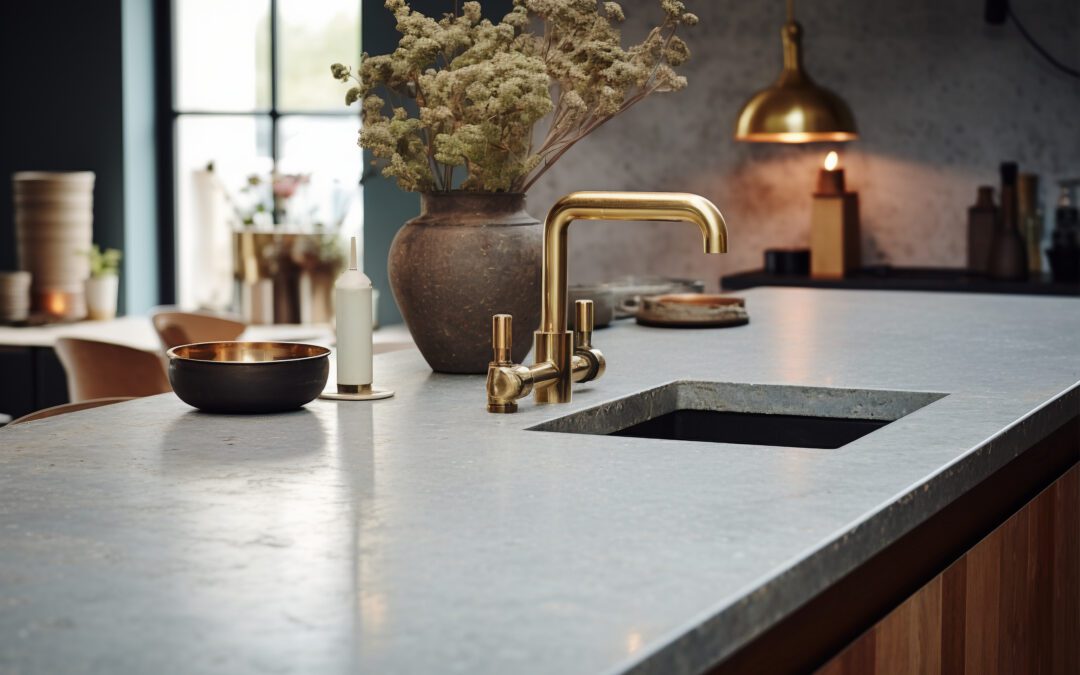The Pros and Cons of Quartz Countertops
Key Highlights
- Exceptional Durability: Quartz countertops are among the most long-lasting materials available, often lasting for decades.
- Design Variety: Manufactured with resin and pigments, quartz offers nearly limitless design possibilities and color options.
- Higher Price Range: Quartz typically costs between $50 and $200 per square foot
Quartz countertops have become one of the most popular choices for modern kitchens—and for good reason. Known for their strength, beauty, and versatility, quartz surfaces can elevate any home interior. However, with higher prices compared to other countertop options, it’s important to understand both the advantages and disadvantages before investing.
What Are Quartz Countertops?
Quartz countertops are engineered stone surfaces made by combining natural quartz crystals with synthetic resins and pigments. This mixture—about 90–94% ground quartz and 6–10% resins—is poured into molds, pressed, cured, and polished to create smooth, durable slabs.
Unlike natural stone such as quartzite, quartz countertops are non-porous, more uniform in appearance, and require minimal maintenance, making them a top choice for busy households.
Pros of Quartz Countertops
- Outstanding Durability
Quartz countertops are extremely resistant to scratches, chips, and cracks. The manufacturing process produces a surface that can handle heavy daily use—ideal for families and avid home cooks. Many quartz brands back their products with warranties of 15 to 25 years, offering extra peace of mind.
- Non-Porous and Hygienic
Unlike natural stones such as marble or granite, quartz does not have pores that can absorb liquids or harbor bacteria. This makes it highly sanitary and easy to clean, perfect for food preparation areas.
- Endless Design Options
Quartz is available in a wide variety of colors, textures, and finishes, including polished, matte, or suede. Whether you prefer a sleek modern look or a more traditional style, quartz can mimic marble, granite, and even concrete. Edge profiles can also be customized to match your kitchen’s aesthetic.
Cons of Quartz Countertops
- Higher Cost
Quartz is a premium material with prices ranging from $50 to $200 per square foot, depending on the design, grade, and complexity of the installation. On average, homeowners spend around $4,500 for a full kitchen countertop project.
- Complex Installation
Quartz slabs are heavy—some can weigh over 1,000 pounds—making installation a job for professionals. Labor typically costs $10 to $30 per square foot. Due to the material’s weight and precision requirements, professional installation is strongly recommended.
- Heat Sensitivity
While quartz is heat-resistant, extreme heat can damage the resin binders. Direct contact with hot pots or pans can cause discoloration or warping, so always use trivets or hot pads to protect your countertop surface.
Alternatives to Quartz Countertops
If quartz doesn’t fit your budget or design goals, several other countertop materials might be a better match:
Granite
Granite countertops provide a unique natural appearance and excellent heat resistance. They are more affordable than quartz, typically costing $15 to $140 per square foot, but they require regular sealing and more maintenance to prevent staining.
Porcelain
Porcelain countertops are durable, heat- and scratch-resistant, and available in many colors and patterns. They are eco-friendly and easy to clean but can be nearly as expensive as quartz, with costs ranging from $50 to $120 per square foot. Porcelain can also crack if exposed to strong impact.
Marble
Marble offers timeless beauty and elegance. Installation typically costs between $3,000 and $10,000, though premium marble can exceed $18,000. However, marble is porous and prone to scratches, requiring regular sealing and careful maintenance to preserve its appearance.
How Much Do Quartz Countertops Cost?
The average cost to install quartz countertops ranges from $2,500 to $12,000, depending on the slab size, quality, and labor. Material prices typically fall between $50 and $200 per square foot, while installation adds $10 to $30 per square foot.
DIY vs. Professional Installation
While DIY projects can save money, installing quartz countertops is best left to professionals. The heavy weight and precision cutting required make this a challenging job for amateurs. Hiring an experienced local countertop installer ensures proper installation, durability, and a seamless finish that enhances your kitchen’s value.
Final Thoughts
Quartz countertops combine durability, beauty, and low maintenance—making them a favorite choice for homeowners seeking a long-term investment. Although the upfront cost may be higher than other options, the longevity, design versatility, and easy upkeep often make quartz well worth it.
Whether you’re remodeling your kitchen or upgrading your bathroom vanity, quartz countertops provide a stylish and practical surface that stands the test of time.


